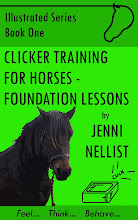Are horses as political as we think or is it just another red herring? I've lost count of how many times people have told me that they just wish they could show their horse who's boss, or how their horse is dominant and so they have to be firm with him, or that because horses try to find the weakest link they must learn to speak horse so thay can manage horses naturally.
I think it's time for a rethink on the dominance issue. First and foremost, what is dominant behaviour for? Is every incident witnessed an attempt by the horse to assert dominance? Is there a simpler explanation?
When a horse is said to be the dominant of a pair of horses it is because in contests over some important resource such as food or water, it has always displaced the other horse and 'won' access to that resource. When resources are short horses do need to compete over them, and after a series of competitions the frequent losers will start to give way more easily to the frequent winners.
But are the contests about dominance rank, or the resource in question? I think that they are about the resource, because when resources are plenty horses fight less. I think when horses compete for a resource they are frightened about losing that resource, because after all, it is important for survival. The horse who is desperate enough, and confident enough in his competitive ability will be more likely to compete, and if the opponent is weaker, he'll win. But ultimately that horse got into the competition because he felt threatened, not because he was into politics for politics sake.
All the above means that 'dominance' behaviour is for competing for stuff when one feels threatened. This means then, that when horses direct pushy, aggressive behaviour towards us they feel threatened or confused and they're not trying to be 'dominant' - unless of course we are making advances on their food bowl!
When a horse feels threatened by our behaviour he has four options: get away from us, behave aggressively, try to change the subject through fidgety behaviour, or plain freeze. Aggressive behaviour in its various degrees is quite effective at making us get out of their way or stop what we are doing to them. It's self defence, not the horse's ambition to be dominant over us.
I think that this means that when horses try to push us, bite us and kick us they are confused about what we are trying to make them do, or we are plain scaring them. This means we have to intelligently find away of training the horse to understand what we want without fear so that we can communicate more clearly. It's just not fair to assume that the horse is trying to get one over on us when more simply, he's just trying to communicate discomfort.
Subscribe to:
Post Comments (Atom)


No comments:
Post a Comment